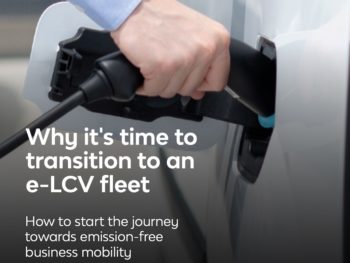Increased electric vehicle choice and growing consumer demand for more sustainable deliveries means white van operators have no excuse not to swap from “white vans to green vans”.

A new white paper from LeasePlan finds that zero-emission deliveries are set to become the new normal going forwards now, reinforced by fast-rising technology developments and a growing appetite among consumers to not just switch to deliveries, but for more sustainable delivery solutions.
The free white paper (download here) finds that the increase in strict low emission zones (LEZs) in cities across Europe is strengthening the demand for electric delivery vehicles – a trend reinforced by efforts to lower carbon footprints among corporate and public sector fleet operators.
And Mark Lovett, LeasePlan UK’s head of commercial vehicles, says the online delivery boom is driving the trend further.
“Because of the pandemic, people are increasingly shopping online instead of going into stores,” said Lovett in an online blog post. “But this is really just an acceleration of a long-term trend. Online shopping has been growing for years but now it’s really having its moment – and that in turn is driving increasing demand for delivery vehicles or light commercial vehicles.”
But sustainability is also a key concern for fleet operators, according to Lovett.
“This crisis has made people more aware than ever that the environment we live in is very fragile. In that sense, electric LCVs are a great way to meet the growing demand for online shopping and delivery services, without sacrificing air quality in our towns and cities. We’ve noticed that the ‘rise of the green van’ is especially interesting to corporate fleet operators, who are looking to cut their own emissions footprints, as well as navigate the growing number of low-emission zones in urban centres that look increasingly unfriendly to older petrol and diesel delivery vehicles.”
But consumers are also looking to go greener. Research published last year by click-and-collect firm Doddle indicated that retailers not offering green delivery options could be at risk of losing customers.
According to Doddle’s analysis, 43% of UK consumers were more likely to shop with a rival retailer that offered a greater range of sustainable delivery options.
This rose to 56% amongst 18- to 24-year-olds, with a figure of 40% among those over 45.
Electric LCV choices are also fast-expanding. Already, a new range of mid- to large-size electric delivery vehicles are being launched direct by OEMs, such as the Mercedes-Benz eVito and eSprinter. This follows new research showing that businesses engaged in last-mile delivery services prioritise total possible cargo volume over maximum payload.
“When vehicles are originally designed and engineered to have a diesel engine, and are then converted to electric, there is a degree of compromise in the payload or the load volume,” added Mark Lovett. “That’s a big issue for an LCV operator, because vehicles have to be the right size and carry the right weight. It’s therefore great to see a sustainable range of delivery vans coming onto the market that don’t need to make this trade-off.”
And most new electric delivery vehicles have an official range of around 160km (100 miles), with some official ranges even rising up to 270km (167 miles) – enabling a day’s worth of deliveries.
In addition, the total cost of ownership for electric delivery vehicles is increasingly competitive, as OEMs develop a new range of ‘electric-first’ delivery vehicles, rather than reconfigure older ICE models. Falling battery costs and the widespread availability of tax benefits and government incentives are also improving the cost-competitiveness of electric delivery vehicles.
Tex Gunning, CEO of LeasePlan, said: “Now more than ever people are relying on next-day delivery services, and this is leading to a huge increase in delivery traffic in urban centres. Electric delivery vehicles are a great way to meet this growing demand for online shopping and delivery services, without sacrificing air quality in our towns and cities. Our research shows that there is now an entire range of next generation electric delivery vehicles about to come onto the market that could transform urban commercial mobility. Simply put: there’s no excuse not to swap your white van for a green van and make zero-emission deliveries the new normal.”
To download the LeasePlan white paper on zero-emission deliveries, click here.

